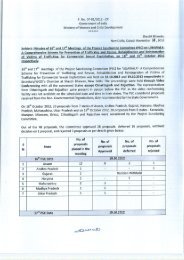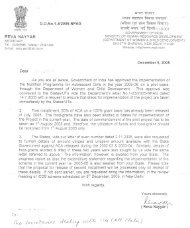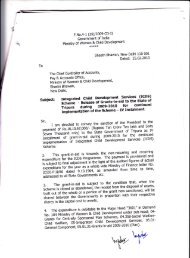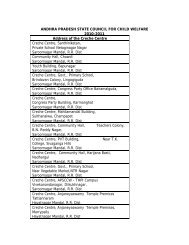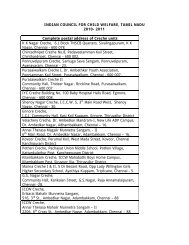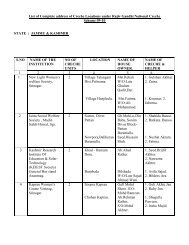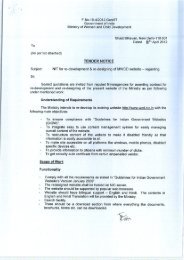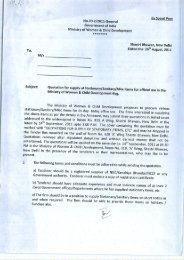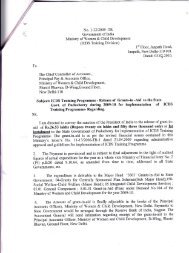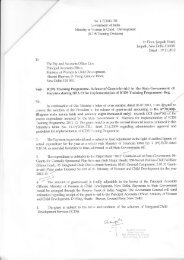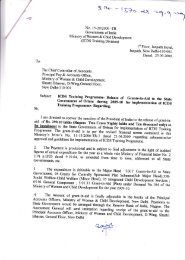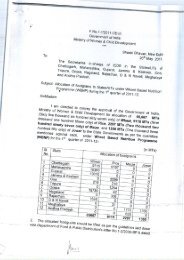COVER HINDI - Ministry of Women and Child Development
COVER HINDI - Ministry of Women and Child Development
COVER HINDI - Ministry of Women and Child Development
- TAGS
- hindi
- ministry
- wcd.nic.in
Create successful ePaper yourself
Turn your PDF publications into a flip-book with our unique Google optimized e-Paper software.
intervention with children <strong>and</strong> their families in different<br />
settings. The course has been designed to enable the learner<br />
to assess <strong>and</strong> plan preventive, promotive <strong>and</strong> therapeutic<br />
need based <strong>and</strong> milieu specific mental health programmes<br />
in schools <strong>and</strong> communities with <strong>Child</strong>ren <strong>and</strong><br />
Adolescents.<br />
8.25 The first batch <strong>of</strong> the course was successfully<br />
completed in August, 2006 graduating thirteen students.<br />
A review workshop was held in May, 2006 with an<br />
objective to review the structure <strong>and</strong> content <strong>of</strong> the course<br />
to strengthen the transaction <strong>of</strong> the course. Based on the<br />
recommendations <strong>of</strong> the workshop the course was made<br />
more student-friendly.<br />
8.26 The second batch <strong>of</strong> Advanced Diploma in <strong>Child</strong><br />
Guidance <strong>and</strong> Counselling commenced in August, 2006.<br />
Eighteen students from the background <strong>of</strong> Psychology,<br />
Social Work, <strong>and</strong> <strong>Child</strong> <strong>Development</strong> have been enrolled<br />
after rigorous process <strong>of</strong> selection comprising entrance<br />
examination <strong>and</strong> personal interview. The course is being<br />
transacted with emphasis on ‘<strong>Development</strong> <strong>of</strong> Self’ <strong>and</strong><br />
‘Acquisition <strong>of</strong> Skills’ through experiential <strong>and</strong> action<br />
learning.<br />
Extension <strong>of</strong> Counselling Services for<br />
Trafficked <strong>Child</strong>ren<br />
8.27 Trafficking <strong>of</strong> children for exploitation is increasing<br />
at an alarming rate. Rehabilitation <strong>of</strong> child victims is a<br />
challenging process encompassing many facets including<br />
overcoming trauma <strong>and</strong> reintegrating into the society.<br />
8.28 Recognizing the need, at the instance <strong>of</strong> <strong>Ministry</strong> <strong>of</strong><br />
<strong>Women</strong> <strong>and</strong> <strong>Child</strong> <strong>Development</strong>, NIPCCD with financial<br />
support <strong>of</strong> UNICEF has developed a training module <strong>and</strong><br />
facilitator’s guide to address long felt need <strong>of</strong> providing<br />
comprehensive counselling services to child survivors <strong>of</strong><br />
trafficking in the country. This year the module was<br />
finalized after three stage pre testing incorporating<br />
feedback evaluation emerged at each stage <strong>of</strong> pre testing.<br />
The outcome is a user friendly, skill <strong>and</strong> activity based<br />
training module that would enable organizations to plan<br />
systematic training for personnel to undertake counselling<br />
interventions with trafficked children.<br />
8.29 During the year the Institute has been organizing<br />
training programmes at its Headquarters <strong>and</strong> Regional<br />
Centres to build capacities <strong>of</strong> personnel already working<br />
in the field <strong>of</strong> anti-trafficking. Till December 2006, three<br />
courses were organised at Headquarters <strong>and</strong> its Regional<br />
Centres.<br />
<strong>Child</strong> Guidance Centre (CGC)<br />
8.30 The Institute is running <strong>Child</strong> Guidance Centres<br />
(CGCs) at its Headquarters <strong>and</strong> Regional Centres located<br />
at Bangalore, Guwahati <strong>and</strong> Lucknow. These Centres<br />
provide diagnostic, therapeutic <strong>and</strong> referral services to<br />
children upto 14 years <strong>of</strong> age with developmental, learning<br />
<strong>and</strong> behavioural problems including childhood disabilities.<br />
Each Centre extends the services through a<br />
multidisciplinary team comprising social worker,<br />
psychiatrist, child development worker, special educator,<br />
clinical psychologist <strong>and</strong> speech therapist.<br />
8.31 During the year (April – December 2006), around<br />
122 new cases were registered for assessment, counselling<br />
<strong>and</strong> therapeutic interventions at the Headquarters <strong>and</strong><br />
Regional Centres. The dominant problems that were<br />
diagnosed were: Learning Disability; Attention Deficit<br />
Hyperactive Disorders, <strong>Child</strong>hood Autism <strong>and</strong> Asperger’s<br />
Syndrome, Minimal Brain Damage, <strong>Development</strong>al<br />
Delays, Mental Retardation, Borderline Intelligence,<br />
Speech <strong>and</strong> Language problems.<br />
Adolescent Guidance Service Centre (AGSC)<br />
8.32 In order to give impetus to the hitherto neglected<br />
areas <strong>of</strong> planning for mental health <strong>of</strong> adolescents, the<br />
Institute during the year 2003-04 started an Adolescent<br />
Guidance Service Centre at its Headquarters with the<br />
specific objective <strong>of</strong> reaching out to adolescents with<br />
counselling <strong>and</strong> psycho-social interventions through a<br />
comprehensive adolescent guidance programme.<br />
8.33 During the year, the Adolescent Guidance Service<br />
Centre continued to make progress to address the needs<br />
<strong>of</strong> Adolescents in the age group <strong>of</strong> 10-19 years <strong>of</strong> age. On<br />
one h<strong>and</strong>, the team <strong>of</strong> pr<strong>of</strong>essionals ventured out to the<br />
nearby schools to conduct need assessment study through<br />
focused group discussion with the adolescents <strong>and</strong> on the<br />
other h<strong>and</strong> the adolescents themselves reported on their<br />
psychosocial competence <strong>and</strong> problems on the Youth Self<br />
Report Inventory. During the current year, the AGSC is<br />
using Total Quality Management (TQM) Exercise with<br />
all the stakeholders to plan the school mental health<br />
programme in the neighbouring government school.<br />
Training under ICDS Scheme<br />
8.34 NIPCCD is the apex Institute for training <strong>of</strong><br />
functionaries <strong>of</strong> Integrated <strong>Child</strong> <strong>Development</strong> Services<br />
136 Annual Report 2006-07



